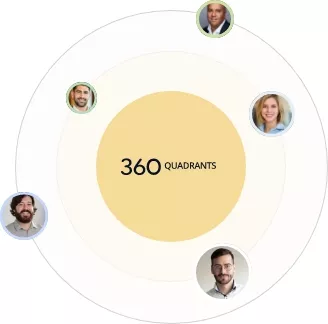According to 360 Quadrant analysis, the following have been identified as the top 10 vendors in the Best Automotive Artificial Intelligence:
Top 10 Automotive Artificial Intelligence vendors
- Nvidia Corporation
- Intel Corporation
- Alphabet Inc
- Baidu Inc
- IBM Corporation
- Microsoft Corporation
- Nuance Communications Inc
- BrainChip
- Qualcomm Inc
- Argo AI
Top Features of Automotive Artificial Intelligence
Artificial Intelligence used in the automotive industry enables users to find solutions to problems independently. AI mimics and supports human actions and provides reactions to machine-based systems.
- Traffic Agents
- Virtual Endurance
- Integration
- Map Processing
- Procedural Object Placement
- Export of 3D Scenes
- Virtual Sensor
- Real-World Measurement Data
- Secure, Flexible and Modular
Impact of AI on Automotive Industry
Artificial Intelligence is highly impacting the automotive industry with its very useful applications. Below is the list of few applications of AI in the automotive industry:
- Cloud Services
- Personalized Marketing
- Predictive Maintenance
- AI Driving
- Self-Driving Cars
- Driver Assistance
- Smart Manufacturing
- Insurance
- Vehicles as Assistants
- HMI based Vehicles
What is Automotive Artificial Intelligence?
The concept of self-driving vehicles has been around for a long period of time. Artificial intelligence is now being used to realize self-driving cars as data generated from sensors such as includes LIDAR, video camera, position estimators, and distance sensors help the automobile identify the surrounding environment and evaluate the contextual implications. Vehicles are equipped with AI systems in order to provide improved safety and convenience features, which are designed to work in conjunction with the automated driving capabilities of the existing cars.
The competitive leadership mapping section provides information regarding key vendors offering automotive artificial intelligence and outlines the findings and analysis as well as rates them accordingly based on vendor performance within each evaluation criterion. The evaluation criteria are based on 2 broad categories, namely, Product Maturity and Company Maturity. Each category encompasses various parameters on the basis of which vendors are evaluated.
Parameters considered under Product Maturity include breadth and depth of product offering, product features & functionality, focus on product innovation, product differentiation and impact on customer value, and product quality & reliability.
Parameters considered under Company Maturity include geographic footprint/presence in emerging markets, breadth of applications served, channel strategy and fit, the effectiveness of organic growth strategy, and mergers & acquisitions strategy.
The best Automotive Artificial Intelligence vendors are placed into 4 categories based on their performance and reviews in each criterion: “Visionary leaders,” “Innovators,” “Dynamic differentiators,” and “Emerging companies".
Among all the Automotive Artificial Intelligence vendors, the top 25 have been evaluated, including NVIDIA Inc. (US), Intel Corporation (US), Alphabet Inc. (US), IBM Corporation (US), and Baidu Inc. (China) and other players.
Visionary leaders are the leading market players in terms of new developments such as product launches, innovative technologies, and adoption of growth strategies. This quadrant receives high scores for the most evaluation criteria. They have a strong service portfolio, a robust market presence, and effective business strategies across the world. Visionary leaders primarily focus on acquiring the leading market position through their strong financial capabilities and well-established brand equity. NVIDIA Corporation (US), IBM Corporation (US), Intel Corporation (US), Microsoft Corporation (US), Alphabet Inc. (US), Nuance Communications, Inc. (US), and Baidu Inc. (China) are the major visionary leaders for the Automotive Artificial Intelligence market.
Dynamic differentiators have established vendors with effective business strategies and market presence. However, they have a weak service portfolio. They focus on a specific type of technology related to the product. Many companies in the Automotive Artificial Intelligence market are largely dependent on their competitive R&D activities. Most of the dynamic players are classified under tier 1 and 2 companies that have a presence in various regions worldwide. Xilinx, Inc. (the US), Harman International Industries, Inc. (the US), Qualcomm Inc. (US), ARM Holdings PLC (UK), General Vision, Inc. (the US), and Advanced Micro Devices Inc. (US) are a few key dynamic differentiators in the Automotive Artificial Intelligence.
Innovators demonstrate substantial product innovations compared with its competitors. They have a focused service portfolio. However, they do not have effective growth strategies for their overall business, and their geographical presence is low. Major innovators in the Automotive Artificial Intelligence market include Argo AI, LLC (US), AImotive (Hungary), Nauto Inc. (US), nuTonomy (US), BrainChip Holdings Ltd. (US), and NeuroControls Co. Ltd. (South Korea).
Emerging companies are the new players that provide value to diverse groups globally with a large group of suppliers, system integrators, end-users, and manufacturers that lead to the evolution of a new player. Some emerging companies in the Automotive Artificial Intelligence market are Zoox Inc. (US), drive.ai (US), Nuro, Inc. (US), BRAIQ (US), Graphcore (UK), and FiveAI (UK).
What’s driving the Automotive Artificial Intelligence market?
- Increasing government regulations for vehicle safety
- Growing adoption of ADAS technology by OEMs
- Rising demand for enhanced user experience and convenience features
- Rising trend of autonomous vehicles
Different type of technology used in Automotive Artificial Intelligence market
- Deep Learning- Deep learning is a class of machine learning based on multiple algorithms for creating relationships among data. Deep learning typically uses artificial neural networks to learn multiple levels of data such as text, images, and sound. Its algorithms help in identifying patterns from the set of unstructured data. The growing application of deep learning algorithms is the major driving force of the automotive AI market. The deep learning technology is widely being used in the developments of autonomous cars. Many companies are investing in the development of self-driving cars in which the deep learning technology is used for image processing, speech recognition, and data analysis. For instance, Google is heavily investing in autonomous vehicles through its spin-off Waymo and has an active system integrated into its self-driving vehicle with the deep learning technology to detect pedestrians in different situations.
- Machine Learning- Machine learning gives cars the ability to analyse and learn from different driving situations, to learn better than any human being can, thus helping in reducing accidents and making the car safer and more efficient. Machine learning can create accurate models that can guide future actions and rapidly identify patterns at a scale that was not achievable before. Machine learning has various technologies such as supervised learning, unsupervised learning, deep learning, and reinforcement learning.
- Computer Vision- The computer vision technology is concerned about the physical structure of three-dimensional (3D) objects attached with an intelligent-based computing system. Computer vision analyzes the information of different geometric shapes, volume, pattern, and provides visual feedback to the user, which is further used to draw the inference. The fundamental objective of the computer vision technology is to interpret the picture obtained through a high-resolution camera. The computer vision technology is very important in semi-autonomous and autonomous cars, as these cars cannot understand human hand signal or any other gestures without computer vision technology. Due to this, computer vision has a high market share for autonomous and semi-autonomous applications.
- Context Awareness- Context awareness is an integral part of computer systems. The development of sophisticated hard and soft sensors has accelerated the growth of context aware processing. LIDAR sensors are used in autonomous and semi-autonomous vehicles for pedestrian detection applications to avoid possible collisions. The complete driving behavior is a combination of the intricate and complex interactions between the driver, vehicle, and the environment, and this behavior cannot be linearly predicted. However, a context-aware system could assist the driver in augmenting the probability of undertaking safe behavior. In-vehicle context aware systems aim at considering more contextual information related to the driving task to produce adapted or customized actions.
- Natural Language Processing (NLP)- Natural language processing (NLP) is a form of automatic speech recognition and is among the fastest-growing AI technologies in recent years. Natural language processing (NLP) is the ability of a computer program to understand human speech. Natural language processing is developed for making real-time translation and development of systems that can interact through dialogue. The use of natural language processing technology for understanding human speech applications in autonomous driving projects by the companies such as Alphabet Inc. (US) and Uber Technologies, Inc. (US) is the key factor leading to its domination. Virtual assistants in vehicles are also on a rise.
What are the major applications of Automotive Artificial Intelligence?
- Human-Machine Interface (HMI)- Human–machine interface (HMI) is a combination of devices with software applications that informs an operator or a user about the state of process and implement the operator's control instructions. In a vehicle, HMI allows the driver and the passenger to interact with the vehicle by seamlessly delivering convenience, information, and entertainment. The function also provides an opportunity for unique branding and differentiations such as including traditional radio tuners for low-end models and highly complex infotainments through touch panels for high-end models. Major components of HMI include electromechanical devices such as keypads, pointing device, indicators, and alarms. The infotainment category comprises of features such as speech recognition, eye tracking, monitoring driving, gesture recognition, and database of natural languages.
- Semi-Autonomous driving- Semi-autonomous systems include features such as driver assist system involving steering, acceleration/deceleration using sensor gathered information, adaptive cruise control, lane-keeping assist, locating available parking spaces, stopping and starting with traffic, and self-parking. Most of the functions in a semi-autonomous system are controlled by drivers, but some functions such as steering and accelerating are automated. Cars can control specific environmental conditions and traffic, but a human intervention is still required. This technological advancement has been implemented with the deployment of AI in vehicles. AI addresses the issue of safety through an advanced driver assistance system (ADAS), which is considered under the semi-autonomous driving segment. AI tools help detect drivers’ drowsiness and will alert the driver to take a stop to rest. This technology is making the car semi-autonomous by equipping the vehicles with visual sensors, haptic feedback, for instance, steering wheel shakes or automatic steering control when the driver is about to collide, or facial tracking system. The aim of this technology is to translate the biometric data into car behavior.
- Autonomous Vehicle- Autonomous vehicle is the main target of the AI technology in the automobile industry. There are various levels of autonomous vehicles. Automation of cruise control, lane change control, and automated parallel parking are the first level of automation. Combined function automation includes automation of multiple and integrated control systems such as adaptive cruise control with lane-centering where drivers are responsible for monitoring the roadway. Limited self-driving automation is where drivers can give up all safety-critical functions under certain conditions and rely on the vehicle to monitor when conditions require transition back to driver control. In full self-driving vehicles, the system performs all driving functions on all road types, at all speed ranges and environmental situations. For autonomous vehicle, various service and equipment requirements include automatic transmissions, diverse sensors (optical, infrared, radar, etc.), wireless networks, short-range and vehicle-to-vehicle communications, access to maps, and navigation, which includes GPS systems, automated controls (steering, braking, signals, etc.), and connected servers.



